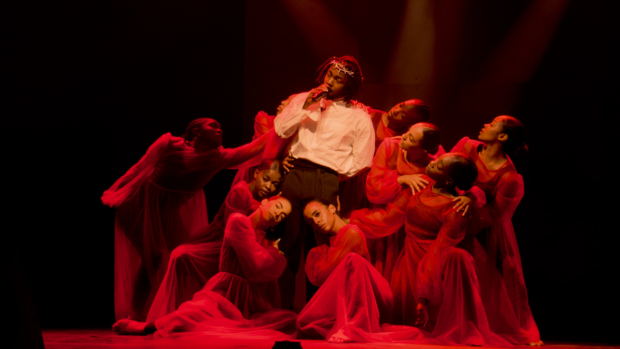Kendrick Lamar produced the best piece of performance art seen this year
Lamar headlined Glastonbury’s final day this summer

© BBC
On Sunday night, three rows from the front of the Pyramid stage crowd (and thankfully spared the worst of the mosh pit), I quickly glanced at my watch between songs: the time was 23:03. Twelve allotted minutes left for headliner Kendrick Lamar to complete his rip-roaring headline Glastonbury act. This is where the triumphant climax kicks in.
Except it didn't. After a repeated and pertinent chant – "they judge you, they judge Christ. Godspeed for women's rights" – at the conclusion of new tune "Savior", Lamar ripped his microphone from its cable and stormed from the stage, leaving a solemn group of backing dancers behind him. They stood, silent, as the audience looked back at them. Then the lights dimmed, the stagehands appeared and the set was dismantled.
The crowd was perplexed – "One more song" the chant went. But Lamar never returned. He didn't conform to the expectations. He'd left on his own terms. Walking away from the stage, I could hear mutter of "anti-climax" and "a bit sudden". But I was buzzing. I felt like a theatre critic who had just seen something unexpectedly brilliant at Sadler's Wells. Lamar had presented one of the best pieces of performance art seen on a stage this year.
He is the second Pulitzer winner I've watched this month – the first being James Ijames' fantastic Fat Ham at New York's Public Theater – a contemporary take on Hamlet. Both have a lot in common: discussing the nature of violence in Black communities, and rejecting the narratives passed down by inherited culture. At the end of Fat Ham, the company decide to bask in disco lights rather than embark on a blood bath. They reject the violence expected of them.
By leaving early, Lamar did a similar thing: he rejected the expectations of those around him. He would not be the bloody-crowned saviour he was made out to be.
The key question is: why? The answer is layered over a 75-minute set, which felt more like a contemporary dance show than a Glastonbury headliner.
Lamar's company of white-and-red-dressed dancers, flooding across the stage during almost all the numbers, conjured ideas of religious conformity, the expectation of "good behaviour" from Black communities (something also explored in Daniel Ward's fantastic The Canary and the Crow) and a gendered binary. If not already obvious, all these themes have been of great importance in the last few days, given the events in the Supreme Court.
The concert was Lamar's opportunity to interrogate his own Christian views, given those of the same religion are perfectly willing to strip individuals of rights with sheer abandon. During "Savior", his gilded crown of thorns, worn throughout the show, started to weep blood: what was initially a symbol of prestige became one of messy pain. The hypocrisies of Christians are obvious to him: "Seen a Christian say the vaccine mark of the beast/ Then he caught COVID and prayed the Pfizer for relief".
But, in his final defiant cry (above), he reached a conclusion – those who stripped women of rights will be judged and found wanting. A belief system can triumph over an institution. It was personal, biographical, intimate and breathtaking in the same moment: "The cat is out the bag, I am not your savior."
Music festivals can reach new heights when they embrace the art of performance.












